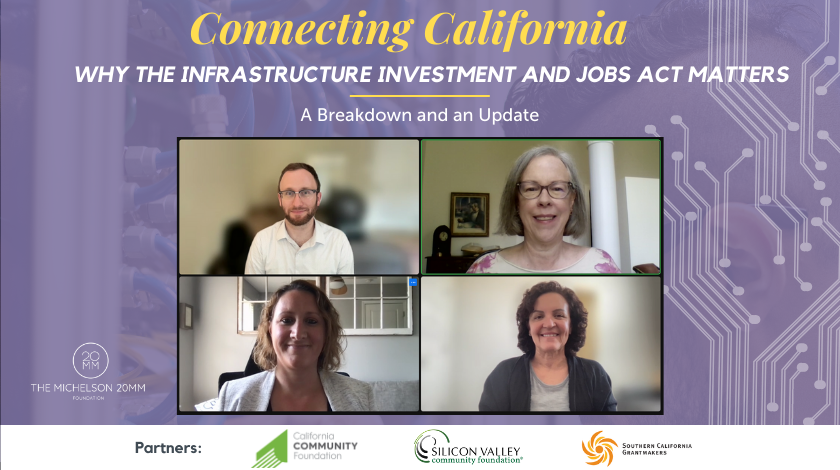News and Announcements
National Experts Weigh in on How the Largest Federal Broadband Investment in U.S. History Can Improve Access for Digitally Redlined Communities
Published Date
- May 27, 2022

Michelson 20MM Foundation’s latest Connecting California series installment explored opportunities created by this broadband investment
By Justin Chapman
Access to high-speed internet has become essential to participate in today’s society, from education to healthcare to business and more. But not everyone has equal access. One in four California families living 200 percent below the federal poverty line cannot afford broadband service, leaving them unable to access many critical services.
“The internet is the underlying infrastructure for everything, and the less bandwidth you have, the less you can do or engage in modern society,” said Drew Garner, State Broadband Policy Fellow at Common Sense Media, during the Michelson 20MM Foundation’s latest Connecting California: Solving the Digital Divide series discussion.
Last year, President Biden signed into law the Infrastructure Investment and Jobs Act, which dedicates $65 billion to bridge the digital divide. This is the fourth funding stream from the federal government in the past two years for broadband infrastructure and accessibility.
Michelson 20MM’s latest installment in the Connecting California series explored opportunities created by this historic investment as part of its broader Digital Equity Initiative, which works to close the digital divide through collaboration, policy and investments. Watch the full conversation below:
Adrianne Benton Furniss, executive director of the Benton Institute for Broadband & Society, moderated the discussion featuring Garner; Amy Huffman, policy director at the National Digital Inclusion Alliance; and Adriana Sanchez-Ochoa, deputy director at NextGen Policy.
“As the single largest federal investment in broadband in U.S. history, the Infrastructure Investment and Jobs Act presents a chance to catalyze and improve access for communities that have been digitally redlined for decades,” Dr. Gary K. Michelson stated. “However, we must ensure that equity is at the forefront of implementation. We must not allow this historic investment to simply perpetuate the monopolies of powerful internet service providers. We cannot continue to prioritize profits over people.”
The Infrastructure Investment and Jobs Act’s investment in broadband is comprised of three main parts: the Affordable Connectivity Program, a $30 monthly benefit for internet services to help remedy the barrier of service affordability; the Broadband Equity Access and Deployment Program; and the Digital Equity Act.
Of course, the connectivity program alone will not solve all the barriers to broadband access. The reality of digital redlining is such actual infrastructure in low-income neighborhoods doesn’t exist or is inadequate. That’s where the deployment plan comes in, which includes $42.5 billion in grants for broadband infrastructure. States will get block grants that they can then use to administer and fund their own competitive sub-grant programs. How much each state gets will be based on the percentage of unserved households in that state. Letters of intent from the states are due July 18, which will automatically designate $5 million toward planning efforts.
The intention is to build fast, affordable, universal internet service for every household in the proposed region, starting with unserved and underserved areas. Community voices will be integral in states’ efforts to develop digital equity plans, which will open the door to federal dollars.
“To really make sure we’re delivering on the promise of these federal monies, we have to build equity into every single thing we’re doing here,” Furniss said.
Huffman said the Digital Equity Act provides $2.75 billion for a state digital equity capacity grant program and $1.25 billion for the federal competitive grant program.
“It really encourages states to talk to people to find out what it’s like for them to live in the digital divide, and particularly those covered populations to understand their needs and their gaps so that they can create programs that really address them,” Huffman said.
If you would like to learn more, we invite you to view the recording, read the full transcript, and access additional resources mentioned during the event.
Michelson 20MM is a private, nonprofit foundation seeking to accelerate progress towards a more just world through grantmaking, operating programs, and impact investing. Co-chaired and funded by Alya and Gary Michelson, Michelson 20MM is part of the Michelson Philanthropies network of foundations.
To sign up for our newsletter, click here.